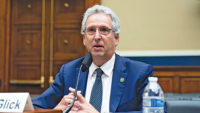Mortimer L. “Mort” Downey III, whose more than six decades of public service included high-level policy positions at the U.S. Dept. of Transportation and leadership of two major U.S. urban transit systems, as well as a C-suite role in a major industry firm and status as the "go-to advisor" for public agencies, died Nov. 2 of pulmonary fibrosis at age 87 in Fairfax, Va., according to an online obituary.
During his long career, Downey frequently was challenged to address longstanding deficiencies in transportation budgeting and infrastructure investment. At the Port Authority of New York and New Jersey, which he joined in 1958, he played a key role in justifying its acquisition of a bankrupt railroad network to create the now much-used PATH commuter rail system.
In his biography as a named Fellow of the National Academy of Public Administration, Downey recalled that the policy case for the acquisition was “based on a system approach that showed how transit investment was, even at a deficit, more cost-effective than very expensive new bridges, tunnels, and highways.” Downey would subsequently be part of the PATH operations team.
As Executive Director and Chief Financial Officer of New York City’s Metropolitan Transit Authority (MTA) from 1986 to 1993, Downey’s use of tax-exempt bond funding provided much-needed resources for major capital programs, including the agency’s deteriorating centerpiece subway system. During 12 years at the agency, he was involved in initiating capital rebuilding of the MTA system—overseeing financing for and programming of more than $20 billion of capital investment into its regional transportation facilities.
“Without his wizardry, fiscal and otherwise, all the improvements that followed wouldn’t have been possible,” current MTA Chair & CEO Janno Lieber said in a statement.
Downey’s ability to navigate intricacies associated with one of the world’s most complex transportation systems drew attention at the national level. After a nearly two-year stint as the first transportation analyst for the U.S. House of Representatives’ Budget Committee, he joined the Carter Administration in 1977 as Assistant Secretary of Transportation for Budget and Programs.
DOT 'Chief Operating Officer'
Downey would return to Washington in 1993 to serve as Deputy Secretary of Transportation. During eight years in the post, often characterized as the U.S. Dept. of Transportation's chief operating officer, he helped craft the 1998 Transportation Equity Act for the 21st Century (TEA-21), as well as the Amtrak Reform and Accountability Act and the formation of the Federal Aviation Administration’s Air Traffic Organization.
After leaving government service in 2001, Downey brought his planning and financing expertise to the private sector, taking a role as chairman of PB Consult Inc., the strategic consulting practice of professional services giant Parsons Brinckerhoff, now part of Canada-based WSP.
Large-scale projects he was involved in at the firm included the Panama Canal expansion, London’s transportation network and rail tunnels connecting New York and New Jersey. He also served on the Obama Administration transition team following the 2008 election.
"Mort Downey was a special person, whose contributions to the transportation industry and to society in general will be missed," says Mike Schneider, founder and CEO of PB Consult, who now is a California-based consultant. "His intellectualism and humility represented a rare breed of humanity, and he set a standard as an icon and role model for so many of us who knew and worked with him."
According to Schneider, Downey said he had "no less than 40 offers and opportunities for major leadership roles within the industry" when he left public service, but he joined PB Consult "because he wanted to work on projects that could be transformative. He did not want to be a figurehead executive or 'potted plant,' but to work with young folks with a goal to change the world."
Downey was a much sought-after commenter on key issues. Related to budget negotiations just after the 2004 election, he told ENR "the budget deficit is going to loom even more importantly than it has been. Particularly with the election of conservative GOP Senators, the pressure is going to be on for budget-cutting, holding the line."
He also had a strong interest in multi-modal transportation systems, serving as chairman for the Coalition for America's Gateways and Trade Corridors. “We’re not going to ask DOTs to be like railroads and trucking companies, but where there are interface facilities, we must figure out how to work together," he told ENR in 2008. "Trade corridor infrastructure is well-suited for public-private partnership funding since so many private interests benefit from it."
A deadly 2009 crash on Washington, DC’s Metrorail system led to Downey’s appointment the following year as a federal government representative on the board of the Washington Metropolitan Area Transit Authority (WMATA). His one-year term as board chair in 2015-16 was marked by friction with other board members over the pace of organizational reforms, and criticism for maintaining his role as advisor to PB, which held an $83-million program management contract with the agency.
Downey regularly reported that relationship in financial disclosure reports, but the District of Columbia’s Inspector General charged him with ethics violations, for which he was later cleared. Downey was replaced on the WMATA board in 2016, a year after a toxic smoke incident at an underground Metrorail station killed one passenger and sickened several others.
'Go To' Advisor
Downey terminated his relationship with Parsons Brinkerhoff in early 2015. Later that year, WMATA joined a lawsuit filed by Montgomery County, Md., against the consultant, alleging poor design and management in construction of the $140-million Paul S. Sarbanes Transit Center in Silver Spring Md. The three-level multi-modal hub was beset by concrete quality issues and delivered nearly five years late and approximately $50 million over budget. The $166-million lawsuit was later settled.
Despite the fractious relationship with other WMATA board members, Downey encouraged them “to take on a more public role during their board service, especially in their interactions with Metro’s riders,” said an agency-issued statement on his death. “His impact on the Authority, transit and transportation is immeasurable.”
Born in Springfield, Mass., Downey earned his undergraduate degree at Yale University and a Master’s in Public Administration from New York University. While at the Port Authority, he served in the U.S. Coast Guard Reserve.
Among numerous recognitions, he was cited for lifetime achievement by the Transportation Research Board and the American Public Transportation Association.
Long active with the Eno Center for Transportation Studies, Downey was a past member of the organization’s board of directors. Last month, Eno established the Mortimer L. Downey Fellowship, to collect best practices and insights from past Deputy Secretaries of Transportation to help guide those who will hold the role in the future.






Post a comment to this article
Report Abusive Comment